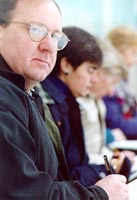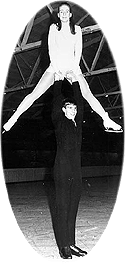![]()
Vol. 71, No.
5, May 1998
Profile
Attorney-at-ice
A quarter century after he hung up his figure skates,
Appleton lawyer Roger Glenn makes it to the Olympics as the U.S. pairs
judge.
By Karen Bankston
Roger Glenn is an experienced and respected judge, but he does not wield
the gavel in the Outagamie County Circuit Court where he practices law.
Instead, the Appleton attorney presides in an international venue, judging
figure skating competitions throughout the world most recently and
notably the pairs event at the 1998 Winter Olympics in Nagano, Japan.

After competing himself for 12 years, Glenn began judging
skating performances. Participating in the Olympics in Nagano, Japan, was
a pinnacle.
|
Glenn, who began judging skating performances after competing himself for
12 years, says participating in the Olympics was indeed a pinnacle.
"I just kept saying to the other judges, 'Think of this as just
another small international competition,' but of course it was different,"
he says. "There are more people, more excitement, more pressure. I've
done two world championships, but they don't get anywhere near the same
attention as the Olympics."
When the expectant hush fell over Nagano's White Ring as competitors
glided onto the ice, the judges were every bit as nervous as the skaters,
Glenn acknowledges. Media scrutiny and those heart-pounding moments as the
world awaits two rows of double-digit scores turn the spotlight quickly
from the skaters to their judges. And while, win or lose, the competitors
can relax after their performance, the judges must look forward to a mandatory
session before the International Skating Union (ISU) the next day where
they defend their scores.
"All of the judges before the events are understandably nervous,"
Glenn notes. "You want to do the right thing, and your reputation is
on the line."
An Illinois native, Glenn grew up in Rockford in a family of four children
with a shared passion for skating that persists today. His sister Diana
Ronayne of Detroit coaches world-class skaters; in fact, had one of her
skaters not switched coaches just before the Olympics, Glenn might have
been disqualified as a judge. His younger sister, Leslie Reilly, also coaches
skating in Connecticut.
Glenn started skating competitively at age 8. During his years on the
ice, he won the 22-state Midwest championships in both singles and pairs
and placed as high as eighth and fifth in national contests. Throughout
his teen years, he spent up to 55 hours a week on the ice, until the demands
of college caught up with him. Faced with the need to keep his grades up
for law school and the threat of mandatory grade reductions for absences
from class "that would kill me every time I had a competition"
Glenn hung up his skates.
Still, it was difficult to leave behind the arena, so when the ISU went
looking for former competitors to become judges, Glenn stepped forward.
In fact, he trial-judged a few competitions before he stopped skating, but
the ISU does not allow competitors to judge.
To qualify as skating judges, candidates assess competitions on a trial
basis, and their scores are compared to the points awarded by the official
judges. Making the grade as a skating judge can be a lengthy process, but
it must have come naturally to Glenn. He skated in his last competition
in December 1971 and received his first appointment as a judge the next
year. He was judging at the national level within a couple years.
"At my first national championship, I was judging people that I
had competed against just a couple years before," he recalls.
By 1982 Glenn was qualified to judge international competitions, and
his sideline has since taken him around the world. He travels to one or
two international competitions and three or four national meets each year.
He has been to Canada, Australia, Italy, Russia, Czechoslovakia, Yugoslavia,
France, Germany, England, and Norway. In the season before the 1998 Olympics,
the ISU shipped Glenn and his fellow judges off to the European championships
for a preview of the competitors.
Travel, lodging, and other out-of-pocket expenses are covered, but judging
is an unpaid job. Still, Glenn says, the fringe benefits are marvelous:
"I've really had a wonderful opportunity to see the world."
Nagano, his first Olympic assignment, marked his fourth trip to Japan
as a skating judge.
The Japanese were wonderful hosts, organized and helpful, he says, but
Glenn focused foremost on the task at hand: the complex dynamics of the
pairs competition.
"I think it's the hardest event to judge," he says. "Even
judges qualified to score pairs sometimes refuse to take on those assignments."

The Glenn children share a passion for skating. Roger Glenn
started skating competitively at age 8. Here he is practicing a lift with
sister Nancy.
|
Skating pairs can perform all the same elements as skaters in the singles
class and then have a whole other repertoire of lifts, spirals, and elements
limited to their genre. "And one of the most important qualities of
the performance is unity," Glenn explains. "The pair has to do
some things exactly the same, and that makes it really difficult to watch
everything at once. At the same time, it's one of the most fun things about
the pairs event."
His lone Olympic disappointment was how little time he was able to spend
with skating competitors. At other world-class events, the American contingent,
skaters and judges alike, travel together and stay in the same hotel. But
at Nagano, the judges were housed in hotels 40 miles from the Olympic Village,
and interaction with competitors was discouraged.
"They felt it would just look better if there was less interaction
between officials and skaters." While Glenn can see the point, "it
might be just a little bit of window dressing. After all, we all know we
have to stand up the next day and defend our scores."
Glenn did not lose touch with his office during the Olympics; in fact,
he even got in some billable hours from Nagano. He took a laptop computer
and logged on daily to America Online to communicate with his office and
emailed in a few pleadings he'd drafted in his hotel room. Glenn has tried
long-distance communications with his office during other competitions,
but quickly discovered that "it's not that easy receiving and sending
faxes to St. Petersburg, Russia."
Glenn is a partner in a four-member firm with partners tolerant of his
sideline. Most of his judging assignments are booked far enough in advance
(he signed on for Nagano 18 months before the Olympics) that he can work
his court schedule around them.
"When I go off on one of these, my wife tells me I'm actually not
home the week before and the week when I come back, and that's true,"
he concedes. "I'm spending all my time at the office to catch up."
Glenn sees a couple of parallels between his twin passions for skating
and the law.
"Judging a skating competition has to be very similar to being a
trial judge," he contends. "You have to listen and watch closely,
take notes, and set aside any preexisting notions you have about the people
involved to render a fair and impartial decision."
In addition, judges at every international meet are required to defend
their scores to the referee at a session following the competition. In some
cases, they may even need to write a "brief" to clarify and explain
the rationale behind their decisions.
"It's just like defending someone in court, but your client happens
to be you," he notes.
Glenn spent eight days at work in Nagano, but he took time for sight-seeing
and watching other events. He was on hand for the U.S. vs. Canada men's
hockey game, cheered as the Americans took home two medals in the two-man
luge, and saw both the male and female American skiers win gold in aerial
skiing.
Maybe the American team bound for gold in 2002 should invite Glenn along
as a lucky charm? "If they want to pay my way to the next one, I'd
be happy to try my luck again," he laughs.
Karen Bankston enjoyed the Olympic pairs competition
as well on a TV not far from the Stoughton office where she works
as a free-lance writer and editor.
|
